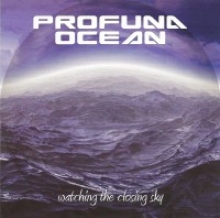MENNO VON BRUCKEN FOCK
WATCHING THE CLOSING SKY (NL+E)

Gitarist, zanger en componist Raoul Potters is de grondlegger van het in 2008 opgerichte Nederlandse kwartet Profuna Ocean. Watching The Closing Sky is het debuutalbum van de band dat voor een regulier album met 37 minuten vrij kort is, maar eigenlijk veel te lang voor een ep. Samen met bassist Arjan Visser - die overigens ook goed overweg kan met de keyboards - René Visser (toetsen, gitaar) en autodidact-drummer Fred den Hartog, maakt Potters muziek die weliswaar een mix is van verschillende genres, maar dan wel met een eigen geluid. De band gebruikt in de eigen muzikale ideeën onder meer elementen uit classic rock, symfo en pop. In de openingstrack wordt het lichtvoetige, enigszins echoënde geluid van Potters gevolgd door een wat steviger stukje, rijkelijk gelardeerd met orkestrale toetsen. Het subtiele drumwerk van Den Hartog en het ‘fuzzy’ basgeluid van Visser verraden jazzinvloeden. Potters’ zang is prettig, maar zijn stem is noch bovenmatig karakteristiek, noch heeft hij een groot bereik. Zijn stem doet mij aan die van Frank Bornemann (Eloy) denken. De overgangen en tempowisselingen zijn bijzonder aardig met onder meer een heavy passage die is geïncorporeerd in de melodieuze naar pop neigende coupletten. Het tweede nummer wordt gedragen door de klanktapijten van de verschillende toetseninstrumenten en door het veelzijdige slagwerk, terwijl het refrein heel duidelijk aan het Eloy van halverwege de jaren zeventig doet denken met heerlijke melancholeke mineurakkoorden. Het gebruik van het orgel draagt bij aan deze nostalgische sfeer. Een gevoeliger tussenstuk leidt tot wat steviger gitaarwerk, maar zeker geen metal! De gitaarsolo en vooral het geluid lijken aardig op die van bands als IQ en Arena. Echt symfonisch is het intro van Sad Silhouette en dit langzame, rustige nummer ontwikkelt zich tot mooie coupletten die sterk worden gedragen door de toetsenbijdragen. Vooral aan het einde lijkt het alsof de G-snaar ietwat onzuiver klinkt, maar de sfeervolle muziek - wederom grotendeels in mineur - compenseert dat ruimschoots. Een heerlijk toetsenintro zoals we dat kennen van Eloy of Pink Floyd in de jaren tachtig, luidt het begin in van S.C.I.T.S, de laatste track van Watching The Closing Sky, die na dit intro een enigszins Dire Straitsachtig vervolg krijgt in een tempo vergelijkbaar met dat van Sultans Of Swing. De Nederlandse band Cloudmachine zou hier ook als referentie genoemd mogen worden, maar de orkestraties, het meer prominente slagwerk en de symfonische intermezzi maken echter het verschil. Ruimtelijke klanken en walvisgeluiden worden gevolgd door Den Hartogs diepe tromgeroffel en vervolgens worden meer populaire passages afgewisseld met stukken die soms aan Pink Floyd, dan weer aan Pendragon of Arena doen denken. Maar, zoals eerder gezegd, het gitaargeluid, Potters stem en vooral het prima basspel van Visser zijn wel duidelijk anders. Watching The Closing Sky is een uitstekend debuut en een uitnodiging om de heren een live aan het werk te zien.
ENGLISH:
Profuna Ocean is a new Dutch band, founded in 2008 by guitarist, singer and composer Raoul Potters. They present their debut Watching The Closing Sky to a wider audience. Together with bass player Arjan Visser, who also knows how to play the keyboards, keyboardist René Visser, who also plays the guitar, and self-taught drummer Fred den Hartog, these four guys blended the musical styles they love with their own ideas. Classic rock mixed with symphonic elements is the end result. The core of the first track is Potters' plucking just a few notes on his guitar, while Visser’s bass joins in with a fuzzy sound and René Visser’s keyboards provide a lustrous tapestry of sounds. Den Hartog's drumming is subtle and refined. Potters’s clear and steady voice is pleasant to listen to, but he has no very characteristic nor wide ranged voice. A more rocking riff-based part at the end leads to a similar kind of music as in the opening piece. Lost Inside starts with pounding drums, spacey keyboards and somewhat dark riffs, alternated by very symphonic keyboard-driven pieces. As in the first track, the chords are played in minor, this time B-minor, so as to provide an extra melancholic atmosphere. The sound of these symphonic parts reminds me of the earlier works by Eloy, even Potters’ vocal sounds a bit like Frank Bornemann's sometimes. The same melodies are used as accompaniment for Potters' solos at the end of this song, very nice, symphonic and ‘Floydish’. A beautiful symphonic intro by René Visser’s keyboards is followed by a gentle piece, featuring Potters’ guitar plucking and vocals. The chorus is pure delight with even more keyboards or rather orchestrations. Again the minor key can be heard to emphasize the emotional impact. To my ears the G-string sounds very slightly out of tune. In the last track again a nice symphonic intro comparable with the music of Eloy in the eighties. Then the electric guitar adds its chords and also a vocal line is added, then the music shifts into a more popular direction, think of Cloudmachine meeting Dire Straits, nice bass playing by Arjan Visser. Within this more pop orientated part there are extremely symphonic instrumental interludes with nice guitar solos by Potters. References could be Arena or Pendragon. The first part of this epic ends with whale-like sounds. Then Den Hartog’s pounding drums announce an instrumental interlude, at first with just a bit of guitar and some strings, later also the bass. Then a more powerful sound with strong guitar riffs together with the bass and drums and all kinds of weird sounds from the keyboards. The last part of this epic is melody-wise a tribute to Pink Floyd, the piano and Potters’ vocals make quite a difference, however. This piece is followed by a sort of reprise of the first one. Watching The Closing Sky is altogether a stunning debut with great melodies and a fine atmosphere, proving that the genre of symphonic and progressive rock is still alive and kicking! A fine addition to the Dutch prog scene.